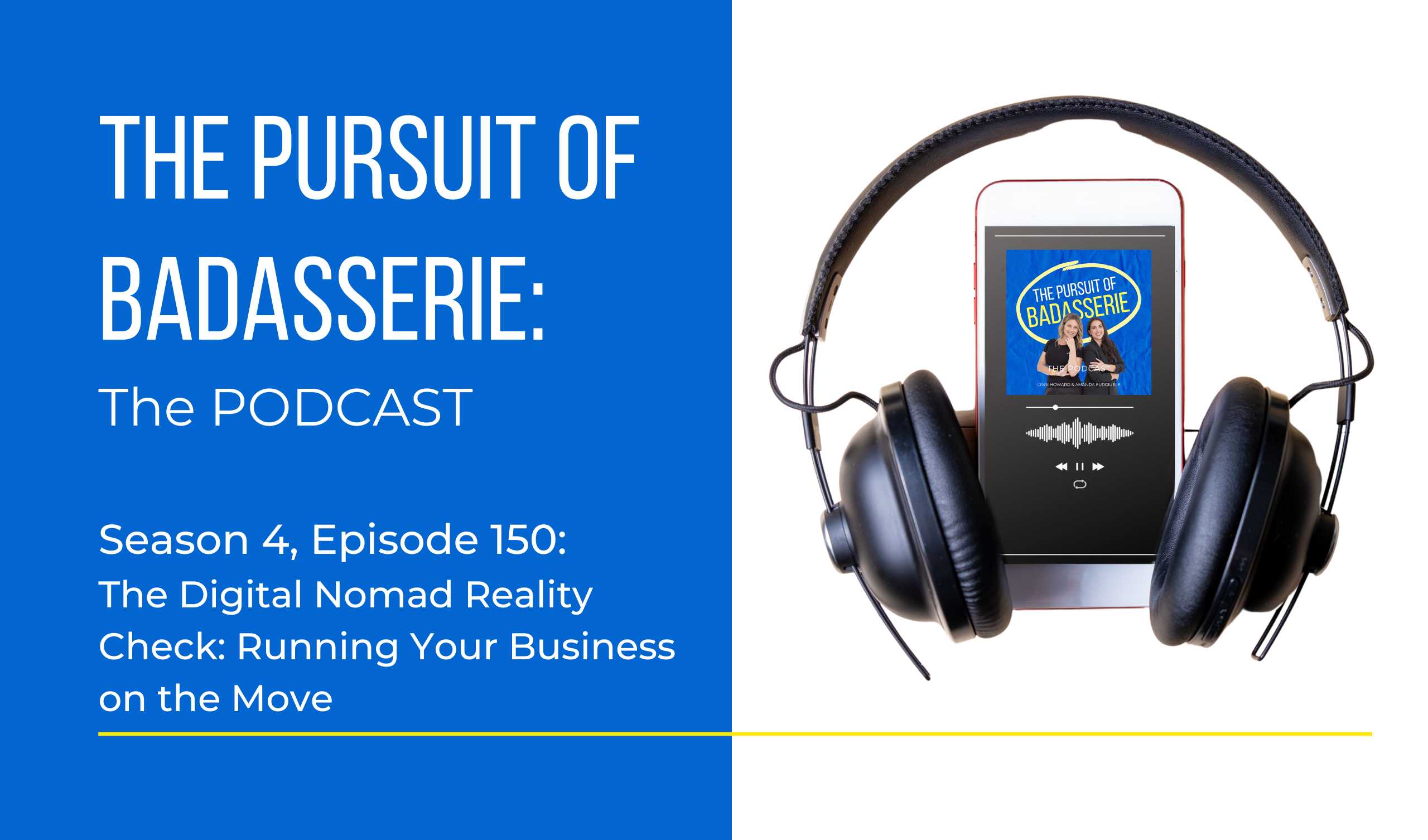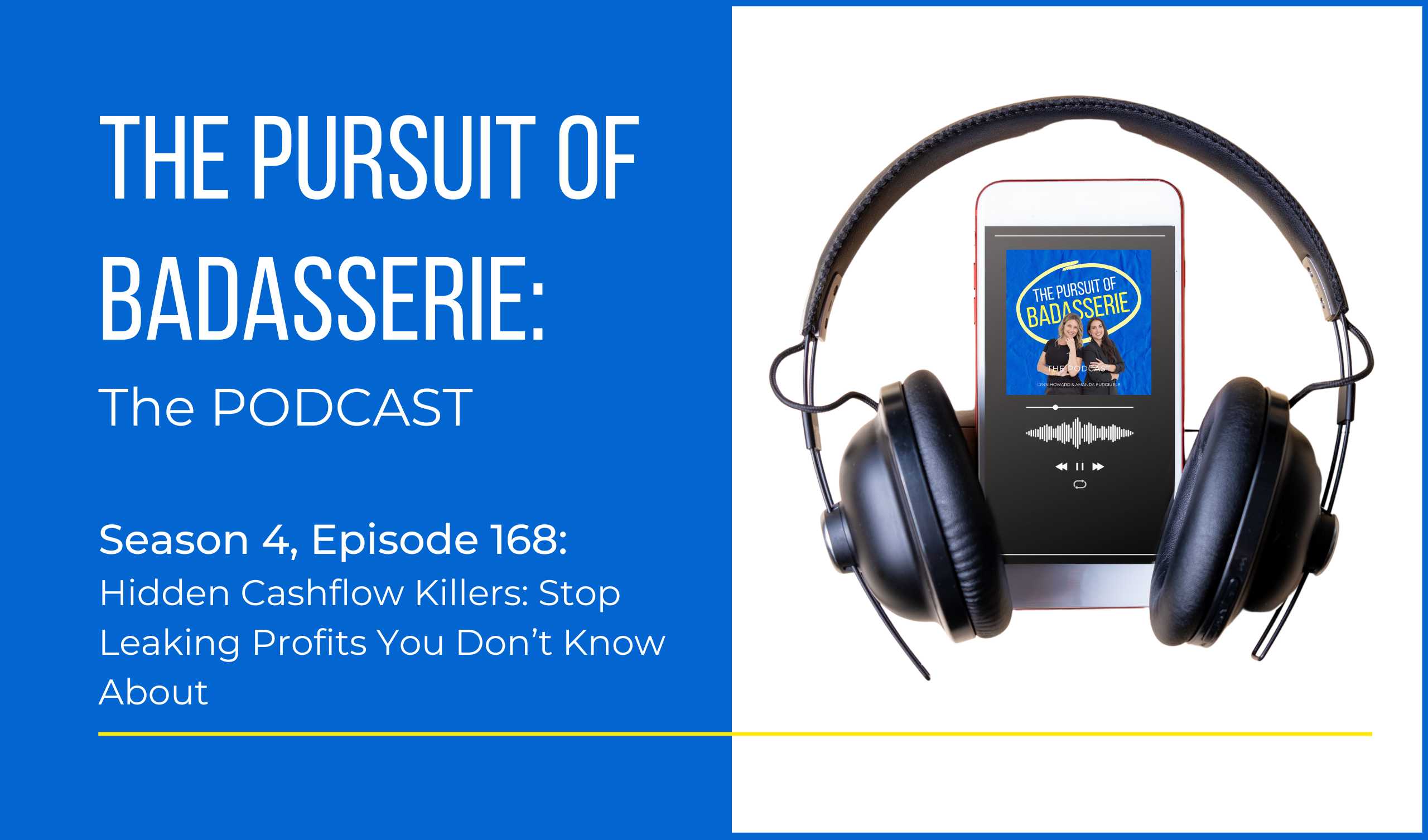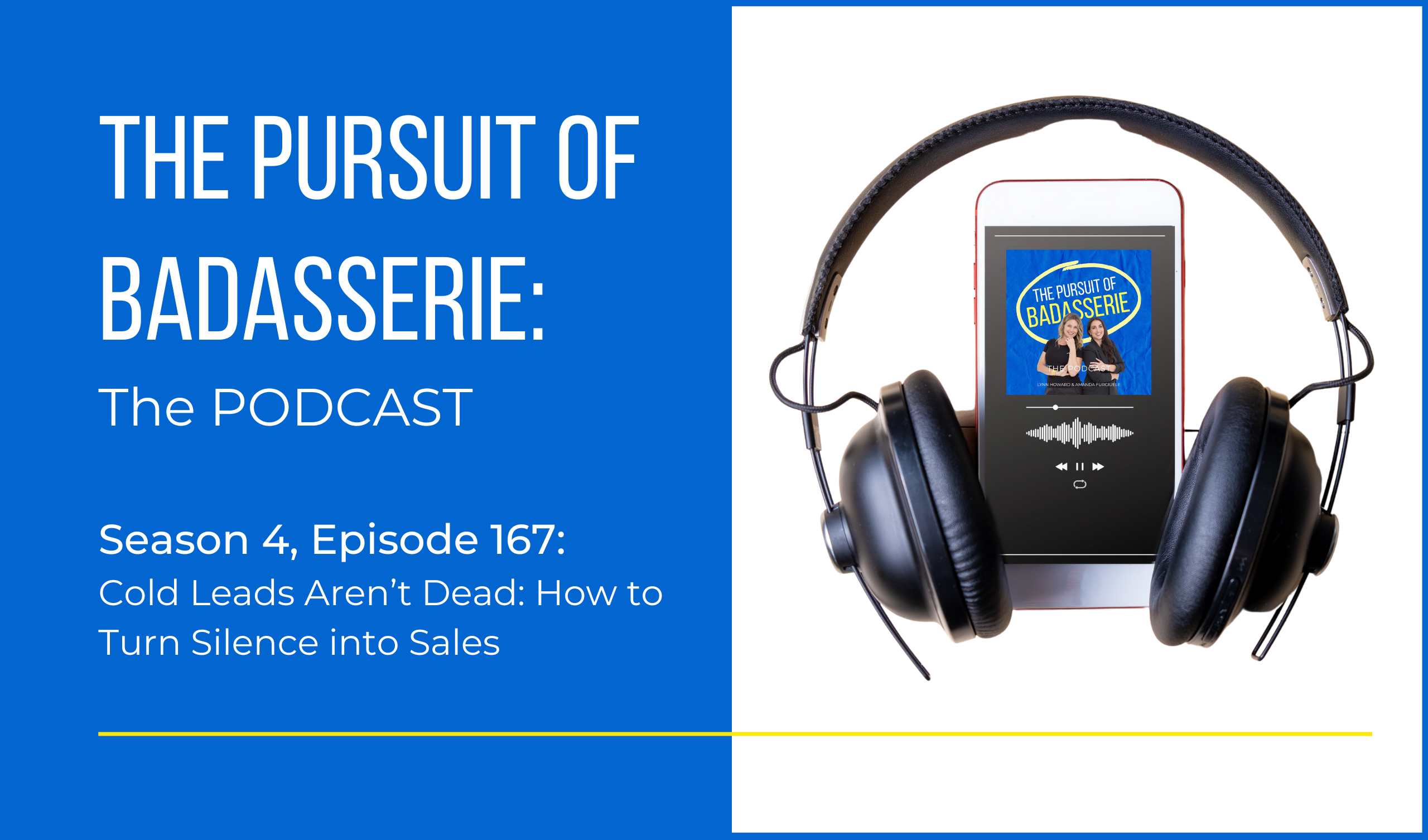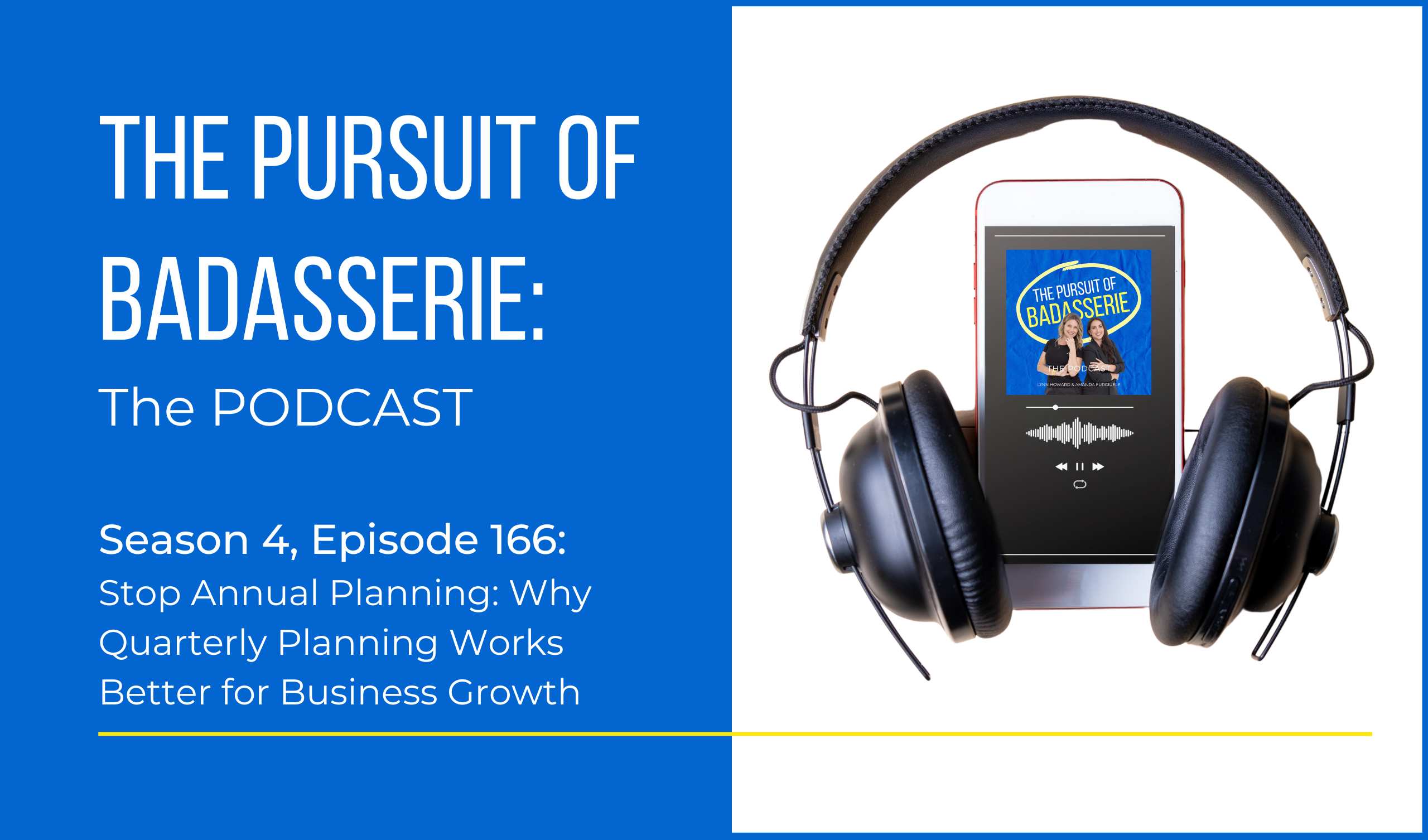Episode 150: The Digital Nomad Reality Check: Running Your Business on the Move
The “laptop lifestyle” looks dreamy on Instagram—beaches, sunsets, and cocktails with Wi-Fi. But let’s get real: running your business while you travel takes discipline, planning, and a whole lot of flexibility.
In this episode of The Pursuit of Badasserie: The Podcast, we’re pulling back the curtain on what it actually takes to be a digital nomad. From missed flights to sketchy internet to time zone gymnastics, we’ll walk you through the real challenges and the strategies that make it possible to keep your business thriving on the road.

Here’s what you’ll learn in this episode:
-
The not-so-sexy truth about time zones, scheduling, and staying accountable
-
Why infrastructure (hello, adapters and Wi-Fi backups) matters more than your destination
-
How to balance client calls, deliverables, and still enjoy the journey
-
The mindset shifts that make working from anywhere sustainable instead of stressful
Whether you’re dreaming of your first working trip or you’re already building your empire from Airbnbs and airport lounges, this episode gives you the reality check (and the blueprint) for making it work.
Because “freedom” doesn’t come from geography—it comes from systems, discipline, and daring to do business on your terms.
Make sure to subscribe to our YouTube or Spotify and leave us a review!
- Like the show? LEAVE US A REVIEW wherever you listen!
- Have a question? CONTACT US at info@thepursuitofbadasserie.com!
- Want to sponsor us? Find out how HERE.
…
Read the full transcript of this episode below:
Lynn
Hey there, I’m Lynn.
Amanda
And I’m Amanda. Welcome to the Pursuit of Badasserie, the podcast. Last episode, we talked a little bit about vacations and what it looks like to step away from your business.
Now we’re going to talk about what it’s like to take your business with you on purpose. Not because you.
You had to panic attack and had to take it with you, but on purpose, intentionally taking your work with you on a trip.
Lynn
Yes, Amanda and I are so good at this. I mean, I’ll use the term, although it’s so bastardized. I mean, I was a professional digital nomad for years prior to COVID, you know, going everywhere, working from everywhere.
I still love that vibe. That’s why I go away to write my book or our books. Whatever, because I like that vibe.
And so, but there are many things that one should do because otherwise you’re just kind of like, you’re not really building a long-term business.
You’re just doing what you need to do in order to be able to get by. And so you absolutely can build a great business while you’re still on the move or digital nomading it.
And there’s just some key things that we’ve learned throughout the years. this Bye. The first one I’m start with is time zone in your calendar, Amanda.
Okay.
Amanda
I knew you were going to say that.
Lynn
I knew the first thing you were going to say is time zones.
Amanda
Yes. No, for sure. It just also feels like a personal attack because it is my number one nemesis. Not, you know what I mean?
Not really. It’s like, it’s totally true. It is my number one nemesis. It doesn’t matter how many alerts and things I set up in my calendar, I will inevitably mess up at least one meeting due to a time zone conversion error.
And I take full responsibility for that. However, it exists. Okay. You can certainly set up in your calendar, alternate time zones.
They exist. You can do it. I swear it is just because I am inept at it. doesn’t mean that you need to be, it absolutely exists.
And there are more than, there’s more than one app that does it. It can work, but that is probably the most important.
You should know what country, how much country you’re in. Which time zone you’re in, what day it is, I almost never do, but it is a constant work in progress, but yes, very important.
Lynn
Well, with that, also, you know, if you’re service-based, like coaches, consultants, trainers, even healthcare providers who do telehealth and different things like that, you know, if you have clients who are standard in a particular time every week or every other week, you know, if you’re only traveling for a week or two, then, you know, maybe it’s okay to not ask them to move, but if you’re going to be gone months, then maybe make it in a time slot that is going to be a bit more, you know, a bit better for you, but also like, it’s kind of a, it’s a, I hate the word balance, but it really is like, you have to have discernment.
You shouldn’t, be moving your clients all around just because you’re moving, but at the same time, like you should have some, some type of.
Like structured to the time that you’re available while you’re on the go and being from, you know, I’ve been doing this for years, pre-COVID.
So I’ve been doing this at least eight, nine years, probably longer, but not as, as intense as the last eight years.
I’ll definitely say the last eight years have been more intense. Well, not the last three being in Bangkok, but you get what I’m saying.
Like for about four years, I was super traveling all the time. And I got to a point where, you know, there’s, and I still am because global clients, I typically won’t book between certain hours and it’s only a four hour gap.
But if somebody lands in that four hour gap, then I’m moving them to another day or another time slot.
And that was just kind of my, my heart because we need our sleep. We, we need to rest as well.
And so just being really kind of on. We’re Thank Yes, just because you can, doesn’t mean that you should stay up the whole time because you’re traveling for a reason.
You also want to see things, but it shouldn’t be at the expense of your clients. I know it’s kind of like a talk around, but you have to find a rhythm in that.
Amanda
Absolutely. mean, I think when it comes to your, all the different facets of it, it, it, I know we hate to use the word balance, but there’s a give and a take.
I think it really comes down to knowing what your, what your schedule is, knowing what your capabilities are.
Start. Knowing what responsibilities you have, because if you’re going to be gone for, I’ll just use my last trip as an example, I was gone for four weeks, was in three different countries, countless cities, multiple time zones, and it wasn’t fair for me to move my clients around every five days, just because I was in a different city every five days.
So I kept my clients at weird hours. So there were clients that I had to be at 2.45 in the morning, crouching over the toilet of the bathroom so I didn’t wake my kid.
And that was a choice that I made. I absolutely, on the alternative side, could have said, you know what, I can’t meet this week, or can we push it by four hours or whatever.
But I made the decision to keep those times because it didn’t make sense to move everybody on my schedule around just because I was moving around so much.
It made it much easier for me just to have my schedule as the only one involved and everybody else moved around me.
So it’s, it’s a choice in how you run your business. And if For instance, when I moved to Bangkok, it was a much more long term.
And there was only one client that I moved times with because it was a weird, really terrible time of day.
But everybody else, I pretty much kept at the same time, even though they were international, because it made sense.
And it was for such a long period of time. But there were other clients that I brought on new that I’ll have to change their time when I move to, when I go back to Hawaii or when I’m on the mainland US.
Like I’ll have to change it because it’ll be three o’clock in the morning my time then. there’s decisions you have to make is the point.
But you get to make those decisions because you’re the owner and you can decide the difference between one client and another, like who’s going to have that time and who’s going to have that energy.
And, you know, what are you doing on your trip? Maybe, maybe you want to have a day off. It’s really okay.
I keep telling myself this. You get to make those decisions. You you have to own those decisions. And why?
The motivation around it and be okay with it because what you can’t do or what you shouldn’t do, I should say, is be all mad that somebody wants to meet when you set up the boundary behind that.
You can’t really be mad if you didn’t update your calendar, if you didn’t make the change, if you didn’t set the expectation, you can’t be the bad one.
Lynn
Sorry. I love that you’ve said that a hundred percent, a hundred percent. Yeah, I was thinking of like when I went to Da Nang, when I was CEO, global CEO of that company, I was doing a lot of sales calls.
And to be honest, I was in Da Nang, Vietnam for four days maybe, and I barely slept because I was doing calls all night and I would do tours during the day, but there were certain things that were on my list I needed to see and I couldn’t move that stuff.
And you absolutely said it. Once you moved to Bangkok, like once I settled in Bangkok, I did slowly start to migrate my clients to a bit, a more feasible time.
So, um, just because, and now I have a hard, um, hard stopper. Okay. So the other thing that I’ve learned a lot, I just experienced this a bunch moving around is making sure that you have the proper infrastructure, AKA wifi, bad wifi.
Like I remember going to India and my friend that I was staying with was going to kill someone because I like wigged out because it was supposed to be the research to help research for me and found like the proper place that had great wifi and I didn’t.
And I had all these calls and it just bad wifi drives me crazy. So fine. You know what, Amanda and I, you did an eSIM.
I have a pocket wifi. know you have a pocket wifi in, um, in Thailand as well, but, um, the pocket wifi is the eSIMs prioritizing, making sure you’re asking.
If you have a lot of zoom calls, see Hey. So place, even if you have to pay more, that you get confirmation that they have a high Wi-Fi speed, you know, you have to, you have to prioritize that if it’s a need of yours, if you’re just going around taking Instagram photos and you be in the heart of like Instagram town, you know, whatever, wherever you’re going in the town, but if you’re going to be on Zooms or calls all the time that you need to prioritize the Wi-Fi.
Amanda
Absolutely. And you know, it can be done. I, in the last two years, have only missed three calls due to no Wi-Fi.
One was in a hurricane. One was poor planning on my part, and I acknowledge that. And one was a typhoon.
So like, it can be done, but you have to pre-plan. And that one that I had where I didn’t plan ahead and I was like, oh, I don’t want to inconvenience somebody by calling down.
On a note. No. It was on Me, there was no Wi Fi. And you know, it’s, you know, what, they didn’t have Wi Fi in the night, there was a whole thing like talking to the front desk, but that needs to be a priority.
So you can make the decision. And it does take some free planning, because Lynn and I go to some crazy places sometimes, and it’s not always a thing.
But it is important to know where your resources are, even something is dumb, and I made this mistake. I don’t know why I just did.
To bring the proper things to charge, like bring all the cords, bring the little adapter thingy, like don’t, don’t, this little thingy, like bring it, bring it everywhere.
And don’t assume that they’re going to have a variation or that they’re going to have like a USB port or like a C port just in because you know, some of the nicer places they’ll have the clocks that have the USB or the C port, like don’t assume they’re going to have anything.
Do your due diligence and bring your stuff. And yes, I know. Weighs a lot. actually something I hate. It’s extra baggage.
I have to carry all these cords around. And I have to carry the cords around because my job, my career, my love, my passion revolves around having a computer and a phone.
So that’s what I have to do. If my job were 20 years ago and I revolved around a pen and a notebook, then I would bring extra pens.
So know what you need, what your non-negotiables are to get the job done and do the thing and just suck it up and carry it around and do the thing.
Lynn
Uh, yes, yes. I think another one, and I know that you have gotten this as well, but like, if you’re building a business and, um, working your business on the move, or as a digital nomad, a lot of people think like you’re just living this best life and, you know, having outsider influence about like, oh, you’re just, I mean, when I moved to Hawaii, I remember people saying, oh, you’re just going to.
I’m on the beach and sip my ties and blah, blah, blah, pina coladas. No, that’s not it. And it’s, it’s not just the outside influence, but it’s also having that super internal discipline to actually do what you need to do because so easy to get caught up in like where you’re at.
So I’m a big person of having, you know, a checklist. I love my, I love my sticky notes and my checklist and my notepad, but that way I’m not just showing up for my calls and showing up for the meetings, but I’m also getting stuff done behind the scenes.
And Amanda and I met several times during this, you know, when we were together, but also separate during these last four weeks to work on those checklists.
Okay. Like this is all the stuff that I have done. This is all the stuff you have done. This is all the stuff the team has done.
This is all the stuff that we need to do collectively. How do we divide that? And I think that that is really important is like, you need to.
Okay. It’s okay to, if you want to have the illusion on Insta about, you know, whatever you’re doing and have that kind of, you know, utopia on Insta, but behind the scenes, know that ‘s real if you’re building a business and if you really are running a business and you have to have the discipline to be able to buckle down and actually do the things that need to be done to continue that, period.
Amanda
Yeah, there’s always going to be toilet calls out of my world, like not on the toilet, but my computer sitting on the toilet, middle of the night phone calls, even in the daytime, I might have to do that because if my kid’s in the other room, if we’re in a, you know, hotel room, not a suite, I need the space, like those are real things that you have to take into consideration and, you know, you can still have whatever aesthetic you want to have and you can also bite off a big ol’ dose to the reality becauseіть you
Traveling and working takes discipline, and it takes planning, and it takes preparation, and it takes flexibility to move around and make adjustments as you need to because things are going to happen.
mean, I missed a meeting, not because I didn’t plan ahead, but because my flight got delayed by seven hours, and that wasn’t on my plan.
I mean, not this trip, but in a previous trip. Things happen, like things change, and you’ll have to be flexible.
And I think another thing that’s really important is being transparent with the people who are working with you so that they understand, because it’s really hard for them to get that you’re, what you’re doing and where you are, and if you have to make a change, if they don’t know anything about it, and they’re just kind of like, oh, you didn’t tell me that you were going to be, like, backpacking through Tibet.
Like, didn’t know that you would be on a yak and not have any Wi-Fi. Like, you got to kind of tell them about that and let them know.
Lynn
Yeah, no, I don’t like doing that.
Amanda
Like I’m a super private person. don’t want anybody to know my business, but I usually will tell my clients if, Hey, I’m not going to, I probably won’t have internet those couple of days.
Lynn
I don’t have to tell them why you don’t have to tell them why, but you should talk about putting it on your email though, too, where that’s why I’ve, I’ve been, I’ve been not as disciplined about changing my email about like, Hey, I’ll be traveling or I won’t be as available.
Um, I used to do it pretty good, but I mean, it’s the same kind of concept. Um, but you can send out a pre email.
And the one thing though, I do want to, I do want to come back to is like, it’s not just about showing up for the calls.
It’s about the other discipline. So yesterday I was just telling Amanda, like I’m in Penang, Malaysia right now. And, um, not necessarily on a vacation, not necessarily on a work trip, but just kind of here for various reasons.
And I stayed in the hotel pretty much the whole time I went. I a cafe for a few hours just to get out, but I worked on my, on things, on the business yesterday, not just showing up to the appointments or whatever, but like actually banged out a bunch of things that needed to be done.
And that was the discipline. Like it was a beautiful day. I could have went out and wandered around. I could have seen things I haven’t seen.
I’ve never been here. Um, but I needed to have the discipline and not feel guilty about not going and wandering around, um, to be able to make sure that I’m getting what I need to do, um, done period.
So it’s not just showing up for the things that are on the schedule, but it’s also all the behind the scenes.
Don’t forget to be doing that. Um, I think that also, you know, uh, when you travel, I think that.
And you, you’re, you work and travel, if your eyes are open, you can actually see the gaps differently in your business and the cracks in your business.
Because you are in different environments. And so you might not have like the, all the necessary, necessary tools or triggers to remind you to do certain things.
And so it really can like open, if you allow your eyes to be open, allow you to really reevaluate some of your processes and the communication points with your team, with your clients, with the prospects.
And different things like that. And just to call myself out, it’s like, you know what, I have not been consistent about posting on social media, except for Instagram stories.
And that’s my least, I would say for me personally, that’s my least active for business. Not that I’m posting, I’m posting my travel.
So, and that’s just because I didn’t set up some things prior to going. And also. also. I’m, it’s not that I’m not having the discipline.
I mean, there is a bit of a choice of me not posting, but it’s not, it’s just because my capacity, your capacity changes when you’re traveling because you’re adding new things.
You might have things taken off of your plate, but you add different things on. And so when you’re exhausted, especially when you’re traveling with people, you know, Amanda and I spent some of the time together with her son.
and so there’s a different dynamic when you’re traveling with people versus when you’re traveling by yourself, good and bad and indifference.
And so it’s kind of like, you know, making sure that you are not accommodating, but, um, accounting for, for that, like kind of saying, okay, what do I need to change?
What do I, what do I need to adapt? Blah, blah, blah.
Amanda
Absolutely. And I think that’s not just for your business, but just in, you know, your day to day, how you.
You’ve got to make those adjustments. You’ve got to be flexible and willing to adapt and make the accountability or account for all the other things that are happening in your life.
And that’s one of the things that I think entrepreneurs have to do on the daily. It’s, you that pivoting.
I know that was quite the buzzword during COVID and so forth, but like the pivoting, the adapting to different things, making changes as you need to on the fly.
And that’s never more present than when you’re traveling because so many new things are happening on the fly. And, you know, it’s, I know that a lot of people look at our work lives and they see these Instagram people working and it’s all sunshine and rainbows and things, but there’s a lot of stuff that happens that isn’t on the Instagram stories and that isn’t shown there.
in which basis. So we’re I’ve really just didn’tinta that That’s usually where the real work’s getting done. mean, the pretty times when, like, the view is great and you’re getting really good work done and all those things align, that’s great, and those are fewer, you know, few and far between when it comes to the reality of traveling and working, particularly if you’re doing it a lot.
And if you have, you know, people that you’re relying on or people who are relying on you, there’s more to it than just a pretty background and, you know, an umbrella in your drink and whatever Instagram story says.
Lynn
I agree. I agree. I Yeah. I feel like, you know, there’s so many different things that we can chat about, but the only other thing, and I know this is a bit more technical that I would say that is important, and I thought about this the other day, and I’m going to touch some wood so this doesn’t happen, is making sure that your devices are back.
Okay. And they are on the cloud, as well. Because if you’re taking all these pictures, like if your phone gets sold, if you’re, I remember one of my girlfriends, they took a boat in southern Thailand, and their laptop got ruined, because it was such big waves, because they had to take a boat to the area of where they were staying.
So just make sure your devices are backed up, and that you have extra security on them when you’re traveling.
Because that is, yeah, you just want to make sure like, you don’t lose everything, especially if your laptop or your phone is your business in your world.
And I feel like all of us feel that way at this point in, in, in the times.
Amanda
For sure. Back up things. I mean, I feel like we could do a whole episode just on like travel hacks and things that we’ve had to do over the course of the last.
But that’s a totally different episode. Please reach out to us. If you have questions about specifics of how we do things, reach out to us because Lynn’s been traveling and working for years and years and years.
I’ve been doing it for a bit now, and I do it with my young son and all the things that go along with traveling with children and special needs kids and homeschooling and all the things.
So if you have questions, we have answers, or we at least have a commiserative story about how horrible things went.
We can certainly talk to you about that. So we want to hear from you. What has gone right on your travels?
What has gone terribly, terribly wrong? Because it never just goes a little wrong. It’s always like chaos. So what has gone wrong?
And how did you get through it? How did you adapt? How did you change things? I know that every time I’ve had, you know, horrible things happen, it doesn’t happen again.
And I’ve made all the arrangements so that it doesn’t happen, at least not in the exact same way. And I, again, so what are the things that you’re doing in your business and how are you traveling and how, what is working and what isn’t working in your business as you are on the move?
Lynn
Absolutely. Share this podcast with someone who has been building a business on the move or more digital nomading and see what they take out of it.
Buttons and way you’re in the know of all of our podcasts coming out. And yeah, till next time.
Amanda
Get after it.



